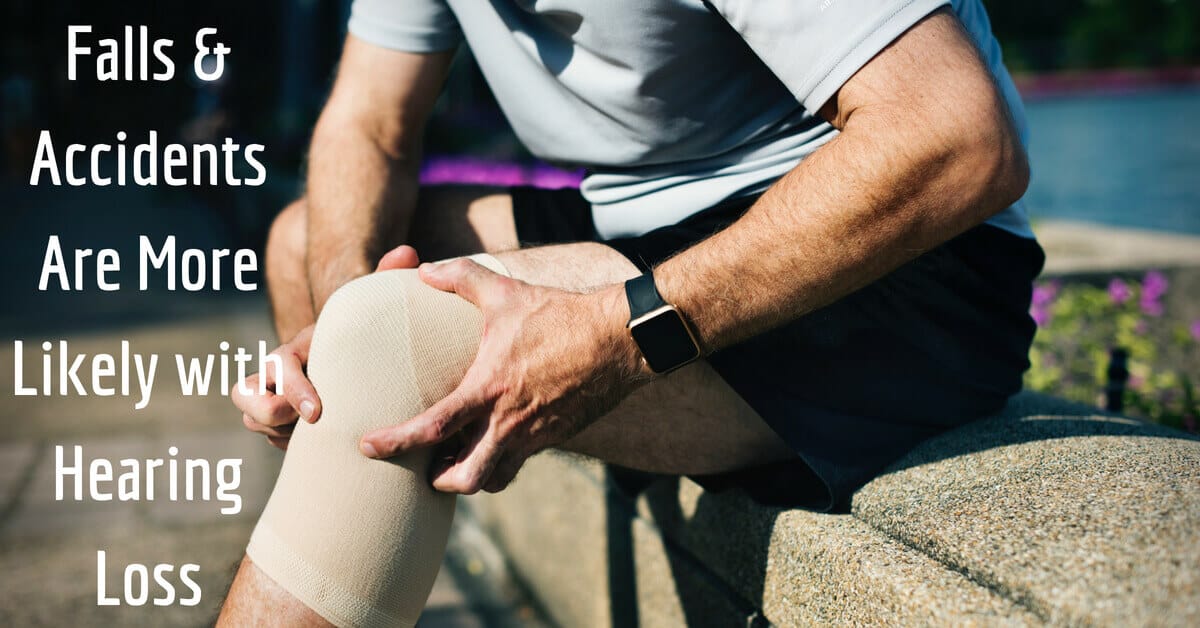
Untreated hearing loss of course affects our abilities to communicate with those around us, and we make adjustments to our communication in order to remain connected to friends, loved ones, and coworkers. Our hearing greatly impacts our abilities to navigate the world around us. When we have untreated hearing loss, then, we also need to make adjustments to how we physically move through the world in order to prevent tripping, falling, and other kinds of accidents.
Studies Linking Untreated Hearing Loss & Accidents
The links between untreated hearing loss and physical mishaps have been confirmed by researchers at universities and medical centers such as Johns Hopkins. This researched has also investigated the affects untreated hearing loss has on a wide range of cognitive issues such as anxiety, depression, and dementia. Overall, it is important to pay close attention to the relationships between untreated hearing loss and overall physical and mental well-being. Armed with this critical knowledge, you will be more equipped to not only address your hearing loss, but to be safer in general.
Hearing loss is linked to the risk of falls and accidents for several reasons—and one of the primary reasons is that hearing loss affects our balance. The three canals in our inner ears, which are also called semicircular canals, control the movements of our bodies: side-to-side movements and tilting movements. Our brains sense these movements when the fluid and hair cells inside each of the canals send information through the acoustic nerve. The other parts of the inner ear communicate to our brain about where our head is when we are still. When we have inner ear problems, there is ultimately a disruption in how our ear canals are working overall. Our brains subsequently are not able to understand or differentiate between our side-to-side and tilting movements—disrupting our overall sense of balance and leading to an increased risk of us falling over. Some researchers believe that people with hearing loss simply devote more energy to hearing and interpreting sounds and conversations. As our brains’ energy is directed toward the difficult task of hearing, they lack the resources to maintain balance.
There are other reasons why untreated hearing loss is related to increasing amounts of falls and accidents. Our overall awareness of our surroundings diminishes when we lose the fullness of our hearing. There are so many ambient noises that we encounter every day: noises like those our pets make when they move throughout our homes, the sounds objects make when we pick them up and put them down, the sounds of people walking on the sidewalk, or of car wheels on the pavement. When we hear these sounds, we have a better sense of where we are in a room, or out on the street. The problem of hearing loss is that it makes it difficult to hear these subtle sounds. When this happens, our overall sense of where we are, what is happening in our surroundings, diminishes. Without a full and rich spatial awareness, we are more prone to run into objects, to miss footfalls (such as missing stair step), and to simply become unbalanced. These little sounds orient us in space, and when we don’t hear them, we are more apt to trip, fall, and have other accidents.
Protecting Yourself by Treating Your Hearing Loss
Thankfully, there are precautions you can take to ensure that you are safe from falls and accidents. The first is to simply keep moving and keeping your muscles strong. It is good practice to put yourself out in the world so that you can understand the effect your hearing loss has on how you navigate your surroundings. What sounds can you hear? Which do you find it difficult to grasp? The more you know about your range of hearing, the better you will be able to keep yourself self.
Regular exercise will help you to maintain a strong lower body, and activities such as Tai Chi and yoga will help you gain and maintain a rooted sense of balance. Taking care of your body’s other senses will also help to improve and maintain balance: schedule an eye exam and pursue any necessary vision care, and talk to your doctor about the risks of dizziness that may be associated with the medications you are taking.
Visit Us at Pacific Northwest Audiology
At Pacific Northwest Audiology, we provide comprehensive hearing health services, from hearing tests to hearing aid fittings. To schedule an appointment, contact us today.
